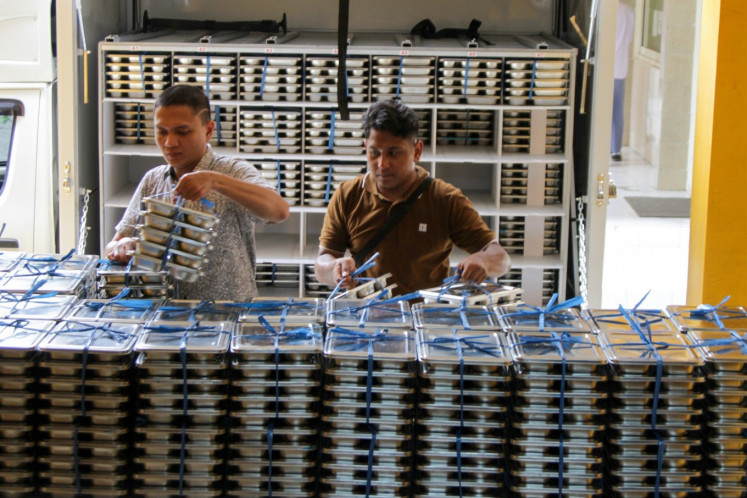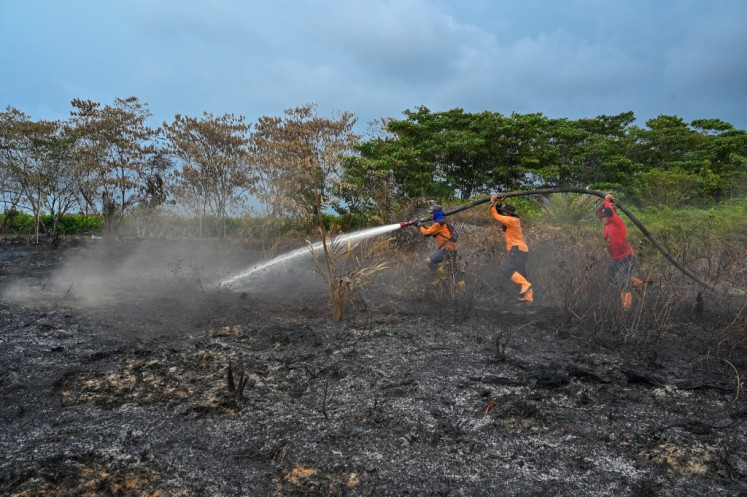Tariff on tinplate imports leave can makers in distress
Domestic can manufacturers have urged the government to revoke the antidumping tariff on tinplate imports from China, South Korea and Taiwan, as the policy is hurting the industry
Change text size
Gift Premium Articles
to Anyone

D
omestic can manufacturers have urged the government to revoke the antidumping tariff on tinplate imports from China, South Korea and Taiwan, as the policy is hurting the industry.
Indonesia Packaging Can Manufacturer Association (APKKI) head Halim Parta Wijawa said the association opposed the tariff on tinplate imports.
“We will be in deep trouble if the Indonesian Antidumping Committee [KADI] recommends that the Trade Ministry extend the policy,” Halim told the press before a meeting with KADI at the Trade Ministry on Friday.
According to the association, the antidumping tariff has strangled the industry in recent years as it has raised the price of tinplate, a basic material in can manufacturing.
At present, manufacturers must bear the costs of the 4.4 to 7.9 percent tariff as well as the 12.5 percent import duty.
The antidumping measure was implemented in 2014 at the request of tinplate producer PT Pelat Timah Nusantara (Latinusa). The request was made as the producer reported lower profits due to increasing competition from overseas producers.
To protect the national tinplate producer, the government, through Finance Ministry Regulation No. 10/2014, imposed tariffs on tinplate imports from China, Taiwan and South Korea for a five year period. The tariff is set to expire in 2019 and is undergoing a review to determine whether it will be continued.
Despite that can manufacturers buy most of its tinplate from Latinusa, they still need to import tinplate to meet demand.
“Latinusa’s production capacity is only 60 percent of national consumption, so we have to import tinplate to fulfill the remaining 40 percent,” said Halim.
According to the APKKI, Latinusa, as the only tinplate producer in the country, produces 160,000 tons of tinplate every year, while national tinplate consumption needs are 250,000 tons per year.
According to the association, which comprises 12 companies, can manufacturers are struggling as the industry is reportedly no longer profitable.
Arief Junaidi, deputy CEO of can manufacturer PT Ancol Terang Metal Printing Industry, said high production costs as a result of the tariff meant the company had laid off 400 employees out of its 1,600 strong workforce.
“As it is becoming difficult to make large profits we have had to implement cost efficiency measures to ensure the company survives and continues to produce cans and bottle caps. Since 2015, we have continued to reduce the size of our workforce,” he said on Friday.
Arief said high production costs meant it was difficult to be globally competitive, especially when foreign can and bottle cap manufacturers could easily sell to Indonesia at a considerably lower price.
“We truly hope that the government is not just considering the interests of one party but also thinking of us, the can and bottle cap manufacturers. The industry will continue to decline if the government extends the tariff because we can no longer compete globally,” he said.
As the antidumping policy on tinplate imports will end in 2019, KADI is conducting a sunset review regarding the policy. The sunset review’s outcome will determine whether KADI will recommend that the government continue the policy or not on the request of Latinusa.
KADI’s head Ernawati said the sunset review is being conducted to determine whether dumping is still taking place. During the review, KADI will also receive reports, opinions and complaints from related parties on the implementation of the tariff, including from the APKKI.
“The investigation is ongoing. We want to make sure that we accommodate all opinions so we can make the right recommendations,” she said on Friday.
Erna said the sunset review, which is expected to be completed by October, could result in an array of outcomes. After considering reports from related parties including Latinusa, can manufacturers and exporters, KADI will give recommendations on whether to continue, halt or adjust the policy with a shorter period or lower tariff.
“But every decision must be made by considering all aspects [of the industry],” she said.









